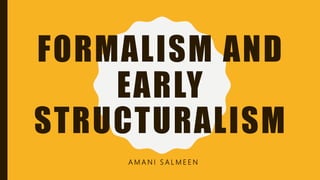
Formalism and Early Structuralism
- 1. FORMALISM AND EARLY STRUCTURALISM A M A N I S A L M E E N
- 2. The different studies of literature and its history have defined approaches or methods that focus on the different elements of circumstances of the literary exchange.
- 3. Participants of Literary Exchange The text The receiver The source Author, other factors that produce the text Reader • These different emphases are a matter of asking different kinds of questions.
- 4. • A school of literary criticism originated in Russia. • Emerged in the early 20th century. • Originally focused in poetry. • The Russians who developed it are called formalists. • Roman Jacobson and fellow formalists translated into English . The English began to take notice of their different approach to Literature. • The formalist perspective was assimilated and developed by the French before it made an impact on the English and American theories.
- 5. • Analysis of the text itself • Readers do not need detailed contextual knowledge beyond the text. • The meaning is inherently conveyed in the text’s unique form or structure.
- 6. • The form of the work as a whole • The form of each individual part of the text (the individual scenes and chapters) • The characters, the settings, the tone, the point of view • The diction • All other elements of the text which join to make it a single text.
- 7. • Biographical information about the author, historical events outside of the story, or literary allusions, mythological patterns, or psychoanalytical traits of the characters.
- 8. • Their intention was to redefine literature; what it means to study literature. • They did not simply aim to identify the brilliant ideas or themes employed by the writer. Formalists point: appreciate how writers manipulate the form. They argue that : literary language should be different from ordinary language.
- 9. DEFAMILIARIZATION (OSTRANENIE) • To see the world a new. • Viktor Shklovsky(1917):” Literature has the ability make us see the world anew- to make that which become familiar, because we have been to it, strange again.”
- 10. LITERARINESS • What makes a literary work different from other texts. • Literariness in poetry : ordinary language becomes defamiliarized. • Poetry subjects language to a process of defamiliarization. How? It employs many devices • Defamiliarization is considered to be the ultimate criterion in establishing literariness.
- 11. FABULA AND SYUZHET • How can we distinguish between the language of fiction and from ordinary language? • Presentation of language In order to clarify this , they introduced two concept : Fabula and Syuzhet.
- 12. • Fabula: a straight forward account of something- tells what actually happens. (like a short summary). • Syuzhet: manipulation of fabula creates syuzhet(the story as it is actually told). • One Fabula can produce many syuzhet. The syuzhet has the defamiliarizing effect. It actively interferes with the story’s chronology.
- 13. FOLKTALES
- 14. • Propp: if you looked closely at many Russian folktales , you will the same underlying story. • He was not a formalist , nor interested in literariness and hardly differentiated between fabula and syuzhet. • In many chronically told folktales, both are identical.
- 15. WHAT IS UNIQUE ABOUT HIS IDEA? • Fairytales might tell one and the same underlying story. • Telling these tales from the same basic story is possible by thinking in terms of actors and functions. • E.g. helper • Propp distinguishes a limited number of actors or ( dramatic personae) and 31 functions.
- 16. Keep in mind • The emphasis is on the form and structure not content. • They viewed Literature as a collection of devices interacting in the text. • Assumed literariness to be a product of employed devices. • Literariness is crafted by defamiliarizing devices. • Estrangement of literary art can help to reach a better understanding of reality. • Formalists looked into the ways in which the language of literature differs from ordinary language.
- 17. BIBLIOGRAPHY Bertens, Hans. Literary theory: the basics. London: Routledge, 2014. Print.